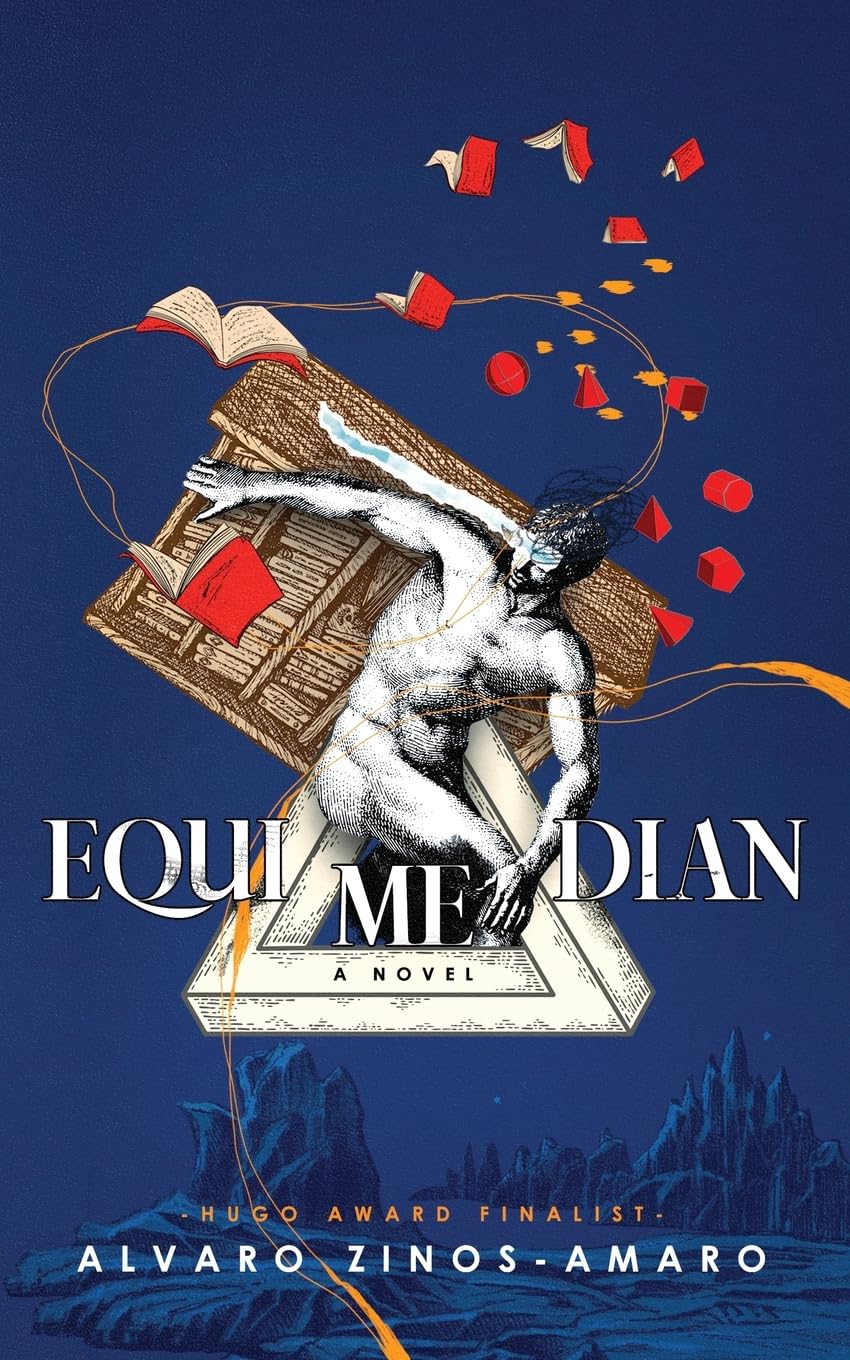
Alvaro Zinos-Amaro is joining us today to talk about his novel, Equimedian. Here’s the publisher’s description:
Jason Velez lives a mundane existence installing EmuX virtual reality machines-scraping together just enough money to pay for his increasingly unsustainable science fiction collection-when he begins having strange dreams. He knows he has to make some personal changes if he hopes to get his life in order.
Except change is exactly what’s happening to those around him. His roommate’s personality suddenly shifts. Jill, his closest single friend, retroactively has a long-term partner. And why doesn’t anyone remember what a wristplex is?
Disoriented by these alterations, and suffering from panic attacks and lapses in memory, Jason tries to convince his friends that something is off, and it might have to do with the enigmatic Progress Pilgrims-a mysterious order who can travel microseconds into the future. But if that wasn’t enough, a flyer labeled only EQUIMEDIAN leads Jason to a meditative self-improvement service that seems to know a little too much about Jason for comfort.
With his walls closing in and nowhere else to turn, Jason must decide where and how to finally make a stand. If he does, he might just change the world-if the world doesn’t change him first.
What’s Alvaro’s favorite bit?

One evening, walking around my neighborhood during the kind of dusk where shadows appear meaningfully deep and the crispness of the air seeps within and seems to texturize your very thoughts, a book appeared in my mind’s eye.
Its actual title was blurry, but I could make out a publisher’s bold pronouncement right beneath it: “A 1970s SCIENCE FICTION NOVEL, FIRST TIME IN PRINT!”
The book would be a modern-day publication, and yet somehow also an artifact of a bygone era.
I grabbed my phone and made some notes.
As I proceeded over the course of several weeks to think about the specifics out of which such a novel might be built–characters, story, setting, themes, aesthetic slant, and so on–I didn’t stop to interrogate where the exact impulse came from.
I was aware, to be sure, of my own fondness for 60s and 70s science fiction. I’d devoured it growing up. Not just New Wave stories, though for a while they were central to my reading diet, but also many works published during that time of upheaval which, while not, technically speaking, part of the proclaimed literary revolution, nevertheless through some kind of proximal osmosis took on exciting qualities.
When I began studying the history of the genre and writing reviews, I looked for insights into the period. I discussed Andrew M. Butler’s Solar Flares: Science Fiction in the 1970s in the pages of Foundation and later covered Dangerous Visions and New Worlds: Radical Science Fiction, 1950 to 1985, edited by Andrew Nette & Iain McIntyre, for Locus, among others. Part of the glory of the New Wave, I realized, was the way it seemed to infiltrate its surroundings. Whether writers were championing it or deriding it, they were reacting to it.
Here, then, would be a generationally-delayed response.
I knew I wanted my novel to be set in that time of ferment–but not necessarily the precise version of that time our history remembers.
My protagonist, Jason Velez, would work as an installer of virtual reality machines, but at heart he would be a fan, a reader who collects books and inhales imagination in his spare time. Jason often thinks of situations and experiences in terms of his reading, so that frequent references to books and stories provide not only an external context for his world but an internal gauge of his character, personality, mood. And even though the novel’s opening timeline isn’t quite ours, I opted to have these references point to our real-world authors and texts, because in a true multiverse of endless possibilities that expresses every permutation of reality, such a combination–slightly different history, identical texts–must exist. How do the meanings of stories change when their context is redefined?
Jason’s tastes are idiosyncratic. He doesn’t go for what, with the benefit of hindsight, we might think of as the Important Stuff; he discovers and explores tales in a haphazard way, and as long as he’s absorbed by some facet of a story, he’s satisfied. During the process of revising my novel, I cut down the allusions going through Jason’s head. At the outset I had created a broad menu of 334 references I could pull from (in honor of Thomas M. Disch’s 334). Even after using only a fraction of these, to keep things in proportion some had to go. Many are by name and title, but not all. For example, there’s a sneaky nod to Disch within the first ten pages.
This brings us back to the novel’s origins. J. S. Breukeelar, who was kind enough to provide pre-publication praise, wrote that Equimedian is “urgent in what it has to say about the combinatory power of words to change the world.” I couldn’t have hoped for a nicer, more astute, summation.
While being able to use science fiction texts and ideas as a way to develop character was a joy during the writing process, Equimedian is ultimately a celebration.
The novel is a heartfelt “Thank You” to the endlessly inventive writers and enthusiastic fans of the 60s and 70s for their creativity and energy.
It is, by design, explicitly in conversation with science fiction of a particularly wild flavor, but it also makes being in conversation with the past part of its structure and plot.
Would Jason himself enjoy reading Equimedian?
I believe he would.
Remembering now the darkening canvas of sky on that long-ago evening of possibilities, that’s my favorite aspect of the novel.
LINKS:
BIO:
Alvaro Zinos-Amaro is a Hugo- and Locus-award finalist who has published over fifty stories, as well as over a hundred essays, reviews, and interviews, in a variety of professional magazines and anthologies. These venues include Analog, Beneath Ceaseless Skies, Galaxy’s Edge, Nature, Vastarien: A Literary Journal, The Los Angeles Review of Books, Locus, Tor.com/Reactor, Strange Horizons, The Year’s Best Science Fiction & Fantasy, Cyber World, This Way to the End Times, The Unquiet Dreamer, Nox Pareidolia, The Book of Extraordinary Femme Fatale Stories, Multiverses: An Anthology of Alternate Realities, and many others. Traveler of Worlds: Conversations with Robert Silverberg was published in 2016 to critical acclaim. Being Michael Swanwick, Alvaro’s second book of interviews, appeared in 2023. Equimedian is Alvaro’s debut novel.
